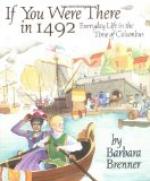Bad conduct of mutineers.
The progress of Porras and his followers through the island was marked by a series of outrages on the natives which completely neutralized the effect of the admiral’s conciliatory policy. They seized forcibly on whatever provisions could be found, and mockingly referred the owners to Columbus for payment. Three attempts to cross over to Hispaniola failed in consequence of rough weather. On one occasion the canoes were in so much danger of being swamped that the Spaniards cast everything on board into the sea; and, as this did not lighten the canoes sufficiently, they then proceeded to force overboard their unfortunate companions, the Indians, who swam after them for a long time, but sank one by one, being prevented by the swords of the Spaniards from approaching. Abandoning, as hopeless, their design of reaching Hispaniola, the mutineers then proceeded to roam over the island, quartering themselves on the Indians, and committing every possible excess.
Of course the influence of this conduct on the relations between Columbus and the natives, was soon apparent. The trinkets and beads, which had once been so precious in their eyes, had first lost the charm of novelty, then the value of rarity. The circulating medium became so depreciated that provisions were scarcely procurable. And, similarly, the personal veneration which the natives had first evinced for the white men, had given way to contempt and to hatred, when familiarity had shown how worthless were these “superior beings.” The Indians refused to minister to their wants any longer; and famine was imminent.
Eclipse predicted by Columbus.
But just at this last extremity, the admiral, ever fertile in devices, bethought him of an expedient for re-establishing his influence over the Indians. His astronomical knowledge told him that on a certain night an eclipse of the moon would take place. One would think that people living in the open air must be accustomed to see such eclipses sufficiently often, not to be particularly astonished at them. But Columbus judged—and as the event proved, judged rightly—that by predicting the eclipse he would gain a reputation as a prophet, and command




